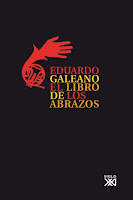(Montevideo: 3 septiembre 1940 – 13 abril 2015)
De 'El Libro de los Abrazos: El mundo (ver texto en castellano abajo)
From 'The Book of Embraces: The world (See English text below)
Eduardo Galeano reads in Spanish: Un mar de fueguitos
EL MUNDO
 “Un hombre del pueblo de Neguá, en la costa de Colombia, pudo subir
al cielo. A la vuelta, contó. Dijo que había contemplado, desde allá
arriba, la vida humana. Y dijo que somos un mar de fueguitos.
“Un hombre del pueblo de Neguá, en la costa de Colombia, pudo subir
al cielo. A la vuelta, contó. Dijo que había contemplado, desde allá
arriba, la vida humana. Y dijo que somos un mar de fueguitos.– El mundo es eso – reveló –. un montón de gente, un mar de fueguitos. No hay dos fuegos iguales. Cada persona brilla con la luz propia entre todas las demás. Hay gente de fuegos grandes y fuegos chicos y fuegos de todos los colores. Hay gente de fuego sereno, que ni se entera del viento, y hay gente de fuego loco, que llena el aire de chispas; algunos fuegos, fuegos bobos, no alumbran ni queman, pero otros arden la vida con tantas ganas que no se puede mirarlos sin parpadear, y quien se acerca se enciende. (...)”
THE WORLD
A man of the town of Neguá, on the coast of Colombia, was able to climb to the high heaven.
On his return, he told a story. He said he had contemplated, from above, human
life. And said that we are a sea of little fires. The world is that—he revealed—A
cluster of people, a sea of little fires. Each person shines with their own
light among all others. No two fires are alike. There are large fires and small
fires and fires of all kinds and colors. There are people of serene fire,
unaware of the existence of wind, and people of crazy fire, who fill the air
with sparks. Some fires, foolish fires, do not shine or burn; but others burn
life so heartily you cannot observe them without stopping to blink, and whoever
gets close, flares up.


2 comments:
I understand that "el pueblo de Neguá" should be translated a "the village of Neguá" (or alternatively "the town of Neguá"). "Pueblo" in Spanish means both "people" (as in "nation") and "village", that's how the Pueblo people of SW USA got the name, because they lived in villages upon "discovery", they were sedentary. Some less grandiose meanings of "people" would be "gente" or "personas" (some people = "alguna gente" or "algunas personas", but "we the People" = "nosotros el Pueblo").
AFAIK (and have searched trying to make sure) there is no people/nation of Neguá and I couldn't find any village either so it's probably an imaginary location (as often used in "fantastic realism", for example García-Marquez' Macondo) or alternatively a very small place very few people know of. And anyhow, if they would be a people-nation, they would be called almost certainly "la nación" o quizás "la tribu". Never before today I even considered it could refer to a people but always to a village (real or not).
In any case, thanks for the translation because that way I could share this most beautiful and inspiring passage across linguistic barriers.
Thank you Maju for your comment. I have now corrected the translation of pueblo. It is much appreciated.
Post a Comment